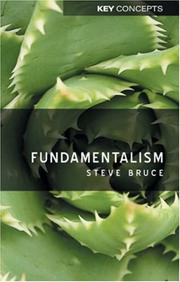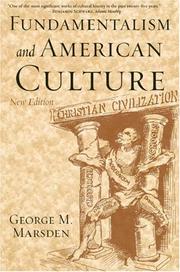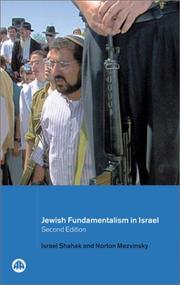| Listing 1 - 10 of 326 | << page >> |
Sort by
|

ISBN: 0745623662 9780745623665 Year: 2000 Publisher: Cambridge Polity press
Abstract | Keywords | Export | Availability | Bookmark
 Loading...
Loading...Choose an application
- Reference Manager
- EndNote
- RefWorks (Direct export to RefWorks)
Book
ISBN: 9780300197723 9780300216011 0300216017 0300197721 Year: 2016 Publisher: New Haven, CT
Abstract | Keywords | Export | Availability | Bookmark
 Loading...
Loading...Choose an application
- Reference Manager
- EndNote
- RefWorks (Direct export to RefWorks)
An incisive analysis of Islamist movements in the Middle East A political, social, and cultural battle is currently raging in the Middle East. On one side are the Islamists, those who believe Islam should be the region’s primary identity. In opposition are nationalists, secularists, royal families, military establishments, and others who view Islamism as a serious threat to national security, historical identity, and a cohesive society. This provocative, vitally important work explores the development of the largest, most influential Islamic groups in the Middle East over the past century. Tarek Osman examines why political Islam managed to win successive elections and how Islamist groups in various nations have responded after ascending to power. He dissects the alliances that have formed among Islamist factions and against them, addressing the important issues of Islamism’s compatibility with modernity, with the region’s experiences in the twentieth century, and its impact on social contracts and minorities. He explains what Salafism means, its evolution, and connections to jihadist groups in the Middle East. Osman speculates on what the Islamists’ prospects for the future will mean for the region and the rest of the world.
Islamic fundamentalism. --- Fundamentalism, Islamic --- Islamism --- Islam --- Religious fundamentalism

ISBN: 0195345827 1280846143 1429438053 9780195345827 9781429438056 0195300475 0195300513 9780195300475 9780195300512 0199741123 0197739245 Year: 2006 Publisher: New York : Oxford University Press,
Abstract | Keywords | Export | Availability | Bookmark
 Loading...
Loading...Choose an application
- Reference Manager
- EndNote
- RefWorks (Direct export to RefWorks)
Many American's today are taking note of the surprisingly strong political force that is the religious right. Controversial decisions by the government are met with hundreds of lobbyists, millions of dollars of advertising spending, and a powerful grassroots response. How has the fundamentalist movement managed to resist the pressures of the scientific community and the draw of modern popular culture to hold on to their ultra-conservative Christian views? Understanding the movement's history is key to answering this question. 'Fundamentalism and American Culture' has long been considered a classic in religious history, and to this day remains unsurpassed. Now available in a new edition, this highly regarded analysis takes us through the full history of the origin and direction of one of America's most influential religious movements.
Book
ISBN: 9789401462099 9401462097 Year: 2022 Publisher: Gent Academia Press
Abstract | Keywords | Export | Availability | Bookmark
 Loading...
Loading...Choose an application
- Reference Manager
- EndNote
- RefWorks (Direct export to RefWorks)
La « radicalisation » est un terme vague, mal défini, qui ne rend pas compte de la complexité du phénomène auquel il renvoie. Par ailleurs, les débats menés sur le thème de la « radicalisation » sont généralement de nature à polariser les opinions. Comment introduire des nuances dans des réflexions généralement stéréotypées et des images préconçues ?Ce livre répond à cette question. Les auteurs remontent dans le temps les traces du phénomène « radicalisation » et s'arrêtent d'abord à la période douloureuse entourant les attentats de Paris et de Bruxelles : l'époque de la guerre civile en Syrie et de l'attrait équivoque qu'elle suscitait auprès de certains jeunes, l'époque du siège de Molenbeek et de la fermeture temporaire d'un club de boxe supposément « radicalisé ». Mais, au-delà, ce livre est le fruit d'une entreprise de dialogue avec des jeunes bruxellois.On le verra, le centre des débats se détourne rapidement de la « radicalisation » en tant que telle pour donner à voir un creuset complexe, qui apparaît comme le reflet sombre d'une société vulnérable. Dans ces dialogues, on entendra les jeunes discuter à propos de la différence entre Nelson Mandela, Anders Breivik et Salah Abdeslam, par exemple. Plus loin, on les écoutera évoquer un enseignement discriminatoire, des violences policières et les blessures infligées par des traitements injustes.Une pensée traverse ce livre comme un fil rouge : notre société est confrontée à des transitions. Notre société est sous pression, et ce qui lui fait défaut pour vivre ces transitions de la manière la moins chaotique possible, c'est une résilience collective.
Book
ISBN: 9781009309653 100930965X 1009309668 1009309676 9781009500487 9781009309646 Year: 2024 Publisher: Cambridge Cambridge University Press
Abstract | Keywords | Export | Availability | Bookmark
 Loading...
Loading...Choose an application
- Reference Manager
- EndNote
- RefWorks (Direct export to RefWorks)
This Element explores the relation between monotheism and fundamentalism. It does so from both an empirical perspective and a more theoretical one that combines theological and philosophical insights. The empirical part addresses how as a matter of fact, particularly quantitively, monotheism and fundamentalism relate to one another. The more theoretical part studies the relation between the two by considering the doctrine of God and the issue of exclusion, theories of revelation, and ethics. Finally, the book considers whether monotheism has particular resources that can be employed in mitigating the consequences of or even altogether preventing fundamentalism. This title is also available as Open Access on Cambridge Core.
Book
ISBN: 1611173558 9781611173550 1306827469 9781306827461 9781611173543 161117354X Year: 2014 Publisher: Columbia, SC
Abstract | Keywords | Export | Availability | Bookmark
 Loading...
Loading...Choose an application
- Reference Manager
- EndNote
- RefWorks (Direct export to RefWorks)
Through a collection of essays, Fundamentalism: Perspectives on a Contested History explores the ways in which the concept of global fundamentalism does and does not illuminate developments in modern Christianity, Judaism, and Islam. At issue is whether, beyond the specific milieu of American Protestantism in the early decades of the twentieth century, the word 'fundamentalism' captures something important on a global scale that is not captured-or not as well-by other words. Readers will quickly discover that in exploring this issue the book is "at war with itself."In Fundamentalism Simon A. W
Religious fundamentalism --- Fundamentalism, Religious --- Fundamentalist movements, Religious --- Religion --- History.

ISBN: 178371171X 1849642133 1281725544 9786611725549 1435661419 9781849642132 6611725547 9781281725547 9781435661417 9781783711710 0745320910 0745320902 9780745320915 9780745320908 Year: 2004 Publisher: London Ann Arbor, MI Pluto Press
Abstract | Keywords | Export | Availability | Bookmark
 Loading...
Loading...Choose an application
- Reference Manager
- EndNote
- RefWorks (Direct export to RefWorks)
Jewish fundamentalism --- Orthodox Judaism --- Religious fundamentalism --- Political violence --- Political aspects
Book
ISBN: 9781845110598 Year: 2010 Publisher: London Tauris
Abstract | Keywords | Export | Availability | Bookmark
 Loading...
Loading...Choose an application
- Reference Manager
- EndNote
- RefWorks (Direct export to RefWorks)
Book
ISBN: 9781611861594 9781609174477 160917447X 9781628951707 1628951702 9781628961706 1611861594 1628961708 Year: 2015 Publisher: East Lansing, MI Michigan State University Press
Abstract | Keywords | Export | Availability | Bookmark
 Loading...
Loading...Choose an application
- Reference Manager
- EndNote
- RefWorks (Direct export to RefWorks)
Christian Fundamentalism is a doctrine and a discourse in tension. Fundamentalists describe themselves as both marginal and a majority. They announce the imminent end of the world while building massive megachurches and political lobbying organizations. They speak of the need for purity and separation from the outside world while continually innovating in their search for more effective and persuasive ways to communicate with and convert outsiders. To many outsiders, Fundamentalist speech seems contradictory, irrational, intolerant, and dangerously antidemocratic. To understand the complexity
Fundamentalism --- United States --- Religious fundamentalism --- Fundamentalist churches --- Fundamentalism -- History. --- Fundamentalism -- United States. --- Fundamentalist churches -- United States. --- Christianity --- Religion --- Philosophy & Religion
Book
ISBN: 1283198339 9786613198334 9956716464 9956716588 9956615560 9789956716586 9956558036 9789956558032 9956558036 9789956558032 9789956615568 9781283198332 6613198331 9789956716463 Year: 2007 Publisher: Bamenda, North West Province, Cameroon Langaa
Abstract | Keywords | Export | Availability | Bookmark
 Loading...
Loading...Choose an application
- Reference Manager
- EndNote
- RefWorks (Direct export to RefWorks)
""This play tackles the theatrically attractive but ethically complex issue of Christian fundamentalism. Nyamnjoh, as a sociologist is well qualified to explore the social problems and psychological pressures which give rise to the born-again phenomenon, and the strong appeal of fundamentalist religion. The Convert, however is no schematic sociological tract. It deals with the conflicting imperatives in 21st century West Africa, which push ordinary people into extraordinary situations, and provides no easy solutions to the issues raised. Although the play revolves around the Ultimate Church of
Fundamentalism --- Christian fundamentalism --- Protestant fundamentalism --- Religious fundamentalism (Protestantism) --- Protestantism --- Theology, Doctrinal --- Evangelicalism --- Millennialism --- Modernist-fundamentalist controversy --- History
| Listing 1 - 10 of 326 | << page >> |
Sort by
|

 Search
Search Feedback
Feedback About UniCat
About UniCat  Help
Help News
News